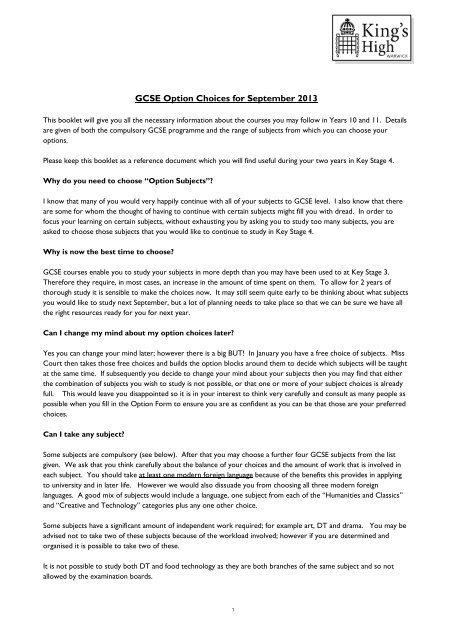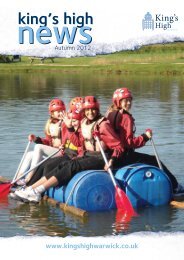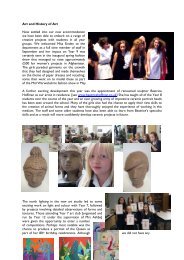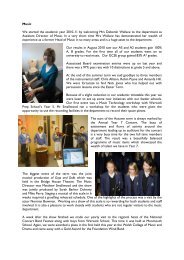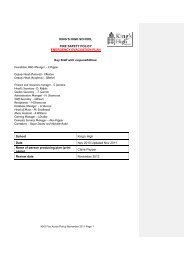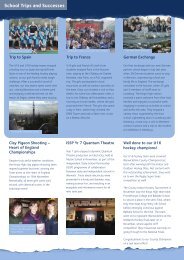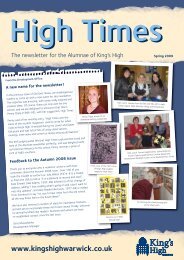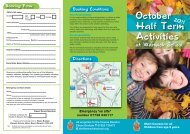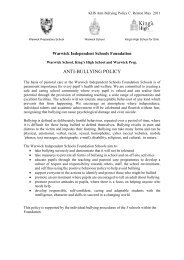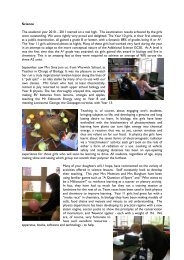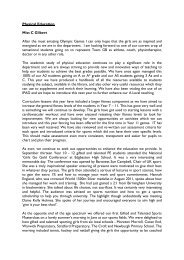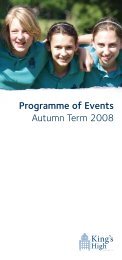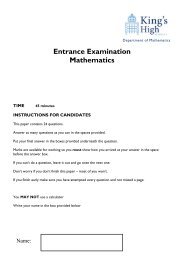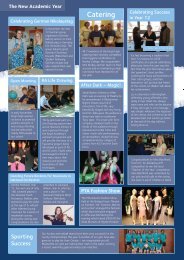GCSE options booklet - King's High
GCSE options booklet - King's High
GCSE options booklet - King's High
You also want an ePaper? Increase the reach of your titles
YUMPU automatically turns print PDFs into web optimized ePapers that Google loves.
<strong>GCSE</strong> Option Choices for September 2013<br />
This <strong>booklet</strong> will give you all the necessary information about the courses you may follow in Years 10 and 11. Details<br />
are given of both the compulsory <strong>GCSE</strong> programme and the range of subjects from which you can choose your<br />
<strong>options</strong>.<br />
Please keep this <strong>booklet</strong> as a reference document which you will find useful during your two years in Key Stage 4.<br />
Why do you need to choose “Option Subjects”?<br />
I know that many of you would very happily continue with all of your subjects to <strong>GCSE</strong> level. I also know that there<br />
are some for whom the thought of having to continue with certain subjects might fill you with dread. In order to<br />
focus your learning on certain subjects, without exhausting you by asking you to study too many subjects, you are<br />
asked to choose those subjects that you would like to continue to study in Key Stage 4.<br />
Why is now the best time to choose?<br />
<strong>GCSE</strong> courses enable you to study your subjects in more depth than you may have been used to at Key Stage 3.<br />
Therefore they require, in most cases, an increase in the amount of time spent on them. To allow for 2 years of<br />
thorough study it is sensible to make the choices now. It may still seem quite early to be thinking about what subjects<br />
you would like to study next September, but a lot of planning needs to take place so that we can be sure we have all<br />
the right resources ready for you for next year.<br />
Can I change my mind about my option choices later?<br />
Yes you can change your mind later; however there is a big BUT! In January you have a free choice of subjects. Miss<br />
Court then takes those free choices and builds the option blocks around them to decide which subjects will be taught<br />
at the same time. If subsequently you decide to change your mind about your subjects then you may find that either<br />
the combination of subjects you wish to study is not possible, or that one or more of your subject choices is already<br />
full. This would leave you disappointed so it is in your interest to think very carefully and consult as many people as<br />
possible when you fill in the Option Form to ensure you are as confident as you can be that those are your preferred<br />
choices.<br />
Can I take any subject?<br />
Some subjects are compulsory (see below). After that you may choose a further four <strong>GCSE</strong> subjects from the list<br />
given. We ask that you think carefully about the balance of your choices and the amount of work that is involved in<br />
each subject. You should take at least one modern foreign language because of the benefits this provides in applying<br />
to university and in later life. However we would also dissuade you from choosing all three modern foreign<br />
languages. A good mix of subjects would include a language, one subject from each of the “Humanities and Classics”<br />
and “Creative and Technology” categories plus any one other choice.<br />
Some subjects have a significant amount of independent work required; for example art, DT and drama. You may be<br />
advised not to take two of these subjects because of the workload involved; however if you are determined and<br />
organised it is possible to take two of these.<br />
It is not possible to study both DT and food technology as they are both branches of the same subject and so not<br />
allowed by the examination boards.<br />
1
Which subjects are compulsory?<br />
All students study mathematics. English language, English literature and the three sciences. When you reach Year 11<br />
most students will be examined for the three separate science I<strong>GCSE</strong> awards. In addition all students have PE lessons<br />
and General RS.<br />
What are I<strong>GCSE</strong>s?<br />
I<strong>GCSE</strong>s are a fully recognised and accredited alterative to the <strong>GCSE</strong>s you may already be familiar with. The structure<br />
of any I<strong>GCSE</strong> coursework or controlled assessment, we believe, will give you the best chance of success and the best<br />
preparation for study beyond <strong>GCSE</strong>. This is why a number of departments have moved to I<strong>GCSE</strong> or are considering it<br />
for the future. Each department recommends to me the specification they feel best suits the needs of you, our<br />
students.<br />
How many subjects do I need to choose?<br />
You need to choose 4 optional subjects in addition to your core of 6 subjects. This will give you a total of 10 <strong>GCSE</strong>s<br />
at the end of Year 11. During Key Stage 4 a small number of girls may request, or have it recommended to them<br />
after consultation with their subject staff, parents and Head of Key Stage to drop a subject to ensure that they get the<br />
highest quality grades. Timetable constraints mean that girls are not able to study additional <strong>GCSE</strong>s within the<br />
curriculum. At present we do not offer any additional <strong>GCSE</strong>s after school.<br />
How should I choose and what is a good balance of subjects?<br />
You should take as much advice as possible from your teachers, your form tutor, careers staff and your parents. Talk<br />
to Dr Cheetham, Head of Key Stage 3; Mrs Hewitt, Head of Key Stage 4; Miss Dormer, Head of Careers or Mr<br />
Bethel, Deputy Head (Academic). There is also a Parents’ Evening shortly before you need to submit your Option<br />
Form to which you are invited to attend with your parents.<br />
You must think carefully about which subjects you are most likely to succeed in and which<br />
you will most enjoy.<br />
How can I get careers advice?<br />
You will receive careers guidance through your PSHE time in Year 9. In addition you may ask to see Miss Dormer,<br />
Head of Careers (j.dormer@kingshighwarwick.co.uk), to discuss any career <strong>options</strong> you may be considering to see<br />
which subjects would be best for your future plans. If you already have an idea of what you may wish to study beyond<br />
Year 11 then in this <strong>booklet</strong> is a table on page 6 that indicates which <strong>GCSE</strong> subjects are required or desirable for each<br />
A level subject that may be offered in the Sixth Form. If you don’t currently have any career aspirations then don’t<br />
worry. Keeping a broad curriculum at this stage will give you plenty of opportunities in the future.<br />
Will I definitely get the subjects I ask for?<br />
In an ideal world we would all get what we ask for! At King’s we attempt to provide as many girls as possible with<br />
their preferred choice of subjects. Occasionally a particular combination of subjects may not be possible, in which<br />
case Mr Bethel will discuss with you, and with your parents if appropriate, what a good alternative might be for you.<br />
It would be important at that stage to have good reasons as to why you chose those subjects initially and an idea of<br />
what alternatives you might like to study. Do rest assured that we will have done everything we can to provide your<br />
first choices.<br />
2
Assessment<br />
Your <strong>GCSE</strong> subjects will be examined through a mixture of written examinations and controlled assessments during<br />
the course. The different percentages that your controlled assessments are worth are outlined in the pages that give<br />
information on individual subjects. Controlled assessments vary in the degree of control that is specified; some for<br />
example require all work to be carried out under examination conditions in class. If all the information that you need<br />
is not on the following pages then do ask your subject teachers for further information so that you are able to make<br />
an informed decision.<br />
The controlled assessments are an integral part of your course in many subjects and contribute towards your final<br />
grade. Many of them take a significant amount of time and resources. It is therefore essential that you attend<br />
on the days that these assessments are due to take place if at all possible. In some instances it may not easily<br />
be possible to offer an alternative time for these. The dates are published well in advance by departments.<br />
If you have any queries regarding these once your course is underway then do talk to your subject teacher, or your<br />
parents may contact Mrs Hewitt, Head of Key Stage 4.<br />
Option choices in the future<br />
In the autumn term of Year 11 you will be asked to focus your learning further in preparation for studying A levels.<br />
The table later in the <strong>booklet</strong> (page 6) lists the subjects that are currently available at A level in school. It should be<br />
noted that not every subject may run depending on whether or not sufficient students request a specific subject.<br />
Please note that on this table is also an outline of the entry criteria for remaining at King’s <strong>High</strong> for your Sixth Form<br />
years. Please ask Mr Bethel or Dr Cheetham if anything is unclear.<br />
Examinations<br />
Just as the percentage of your final mark that depends on controlled assessment varies from subject to subject, so<br />
does the percentage that a final examination contributes. Look carefully at the information on the subject specific<br />
pages that follow and ask your subject teachers if the information that you require is not there. Over the years our<br />
public examination results have been excellent as the charts on the final pages (26-27) show. Our 2012 <strong>GCSE</strong> results<br />
were:<br />
41.33% of the entries were at A*<br />
74.59% of the entries resulted in grades A* or A<br />
95.03% of grades were A*, A or B.<br />
24.5% of the girls obtained all A* or A grades.<br />
Our pupils leave with <strong>GCSE</strong> and A level grades that are significantly above the national average and which give them a<br />
‘passport’ to future education and career choices. It is extremely rare that one of our Sixth Form leavers does not<br />
choose to go on to higher education and you can see from our list of last year's leavers (page 28) the range of courses<br />
and institutions chosen.<br />
3
How do I fill in the Option Form?<br />
You will be asked to tick FOUR subjects, one from each category below plus one additional one from any category.<br />
Modern Foreign Languages<br />
French<br />
German<br />
Spanish<br />
Humanities and Classics<br />
Geography<br />
History<br />
Latin<br />
Religious Studies<br />
Creative and Technology<br />
Art<br />
Drama<br />
Design & Technology<br />
Food Technology<br />
ICT<br />
Music<br />
Subjects may not normally run at <strong>GCSE</strong> unless there is a minimum of 10 girls wishing to take it.<br />
If it is not entirely clear what your wishes are from the form, Mr Bethel will contact you and if appropriate your<br />
parents, to clarify what your first choice of subjects is.<br />
What do I do if I need help?<br />
I hope that this <strong>booklet</strong> and the time that your subject and form staff spend with you in discussing your <strong>options</strong> will<br />
enable you to make informed, intelligent choices. If you need further help then please make sure that you ask your<br />
subject or form teachers, Dr Cheetham, Head of Key Stage 3, Mr Bethel, Deputy Head (Academic) or Miss Dormer,<br />
Head of Careers. Your parents may also have questions in which case they should contact Dr Cheetham, or discuss<br />
their questions with your subject teachers at Parents’ Evening.<br />
4
Timescale:<br />
The following is a list of key events that have happened or will be happening over the next few weeks to enable<br />
you to make your Option choices.<br />
Autumn Term<br />
Friday 14 th December<br />
Thursday 20 th December<br />
Letter to Year 9 parents outlining programme<br />
Year 9 reports home<br />
Spring Term<br />
Tuesday 8 th January<br />
Week of 14 th January<br />
Monday 28 th January<br />
Friday 1 st February<br />
Miss Dormer & Mr Bethel see Year 9 about <strong>GCSE</strong> choices. Girls given<br />
option <strong>booklet</strong> & choices form<br />
Subject staff talk to girls about courses on offer<br />
Year 9 Parents’ Evening<br />
Year 9 to return <strong>GCSE</strong> Option Forms to their Form Tutor<br />
HALF TERM<br />
End of term<br />
Final blockings published<br />
5
A Level Choices - What <strong>GCSE</strong>s Will You Need?<br />
Entry into the Sixth Form from Year 11 at King’s is dependent upon girls achieving a minimum of largely grade Bs at<br />
<strong>GCSE</strong>. Occasionally a student may obtain one grade C in a subject not related to her AS choices. This will not<br />
affect her acceptance on AS Level courses. In addition we strongly recommend at least a grade A in those<br />
subjects that a girl wishes to study at AS level. Any subject specific criteria (in addition to the above) or exceptions<br />
are outlined below. Please discuss any queries with the Deputy Head (Academic).<br />
A Level subject<br />
Art<br />
Biology<br />
Business Studies<br />
<strong>GCSE</strong>(s) required in addition to criteria<br />
above<br />
Grade A at I<strong>GCSE</strong> biology<br />
Grade B maths for AS<br />
Normally grade A maths for A2<br />
<strong>GCSE</strong>s(s) preferred<br />
DT or Art<br />
Grade A at I<strong>GCSE</strong> chemistry and<br />
grade B in mathematics<br />
Helps if do geography as skills<br />
similar<br />
Chemistry Grade A at I<strong>GCSE</strong> chemistry Grade A in mathematics<br />
DT<br />
Economics<br />
English Language /<br />
English Literature<br />
Food Technology<br />
Further Mathematics<br />
Geography<br />
History<br />
History of Art<br />
ICT<br />
Latin<br />
Mathematics<br />
Modern Languages<br />
Music<br />
Politics<br />
Physical education<br />
<strong>GCSE</strong> maths grade B<br />
A* mathematics at I<strong>GCSE</strong><br />
English Language grade A<br />
A good grade A at I<strong>GCSE</strong><br />
Grade A at I<strong>GCSE</strong> in any language taken<br />
for A level<br />
Grade 5 practical<br />
DT or Art or evidence of<br />
continued creativity since Year 9<br />
Food technology helpful but not<br />
essential<br />
History at <strong>GCSE</strong> is strongly<br />
recommended with a minimum<br />
B in history and English<br />
History recommended but not<br />
essential if another humanity is<br />
taken<br />
ICT at <strong>GCSE</strong> (helpful but not<br />
essential)<br />
Preferably grade A at <strong>GCSE</strong><br />
RS and / or history may be<br />
helpful<br />
Grade A in 2 sciences preferred<br />
Physics Grade A at I<strong>GCSE</strong> physics Grade A in mathematics<br />
Psychology<br />
Religious Studies:<br />
Philosophy of Religion/Ethics<br />
Theatre Studies<br />
English Language grade A<br />
A science or a humanity grade A<br />
RS at <strong>GCSE</strong> (helpful but not<br />
essential)<br />
Drama (helpful but not essential)<br />
Our core curriculum of English, science, mathematics and a modern foreign language means<br />
that for most careers and <strong>High</strong>er Education all girls will have the essential <strong>GCSE</strong>s.<br />
6
ART & DESIGN – FINE ART<br />
AQA 4202<br />
What would I study?<br />
You would be set a variety of tasks, each making different demands on your ability, skills, intellect and imagination.<br />
We expect you to respond in an individual way.<br />
What skills would I develop?<br />
You will already have some experience of printmaking, textiles, 3D studies, drawing, painting, and will have done a<br />
little critical and historical work. During <strong>GCSE</strong> you will be developing these skills.<br />
You will learn to use drawing as a means of understanding and recording information and to use your sketchbook<br />
to stimulate ideas.<br />
You will learn how to match these ideas to appropriate media.<br />
You will learn more about the language of art and will be more critically aware of your own work and that of<br />
established artists.<br />
What is the controlled assessment?<br />
Controlled assessment carries 60% of the marks and the externally set examination is worth 40%. Controlled<br />
assessment consists of the various pieces of practical work produced during the two years and there is much to<br />
be gained from working consistently. Individual pieces of work ultimately come together to form a portfolio<br />
developed from more than one extended project. Do not expect to be always doing the same type – or even to<br />
be completing the same amount – of work at the same time as your friends. The emphasis is always on<br />
individuality and personal targets will be set.<br />
The externally set paper offers a great deal of choice and arrives in time for you to do some preparation in<br />
advance of the examination date. The final piece for the project that you choose must be completed within ten<br />
hours.<br />
The course culminates in the setting up of a small exhibition of each candidate's work for the benefit of the<br />
external moderator. While it is the display that is assessed, remember that the examiner takes great delight in<br />
leafing through sketchbooks and supporting studies – these will gain you marks too.<br />
Are there any special requirements for doing this course?<br />
We do expect you to be able to draw adequately. If you can draw brilliantly then that is a 'plus' but it is sufficient<br />
that you can draw well enough to communicate an idea. Drawing does not just mean marks with pencils, it could<br />
just as easily be modelling with wire for example. Commitment is just as important; art project work requires a<br />
large input of personal research and initiative. You have to want to do it.<br />
Are there any restrictions on choosing this option?<br />
No.<br />
If I don't take this subject at <strong>GCSE</strong> can I take it up again later?<br />
Not easily. The two year <strong>GCSE</strong> dovetails neatly into 'A' level studies. Art experience is accumulative in<br />
effectiveness and it is difficult for a re-entering Year 12 student to cope with the progression of learning as well as<br />
trying to cover a gap of two years. You would need to show that you had continued to draw/work artistically by<br />
yourself during this time.<br />
From where can I obtain further information and when is most appropriate?<br />
<strong>GCSE</strong> work is often displayed in the Art Rooms and around school. Ms Lewis, Mrs Ashby and Miss Sinden will be<br />
happy to talk about what is involved at any time.<br />
7
DRAMA<br />
Edexcel 2DR01<br />
What would I study?<br />
<strong>GCSE</strong> Drama is all about understanding what it is like to put yourself in somebody else’s shoes. You will play<br />
many parts in different imaginary situations. You will have the opportunity to create your own work as well as<br />
look at plays written by other people.<br />
What skills would I develop?<br />
As well as acquiring the skills involved in creating, and performing drama, you will also be able to acquire skills in<br />
working with others, problem solving and communication. You will find that drama will help you feel more selfconfident<br />
and prepare you to deal with a range of different situations and people.<br />
The course is in three parts:<br />
• In part one of the course you will use drama to express your feelings and ideas about a range of issues<br />
• In part two of the course you will look at a play to see how a playwright expresses his or her ideas about<br />
a theme or topic and explore ways of making the play work on stage. You will also write an analysis of a live<br />
production that you have seen. You will attend a range of theatre trips organised by the department, for which<br />
there is a small additional cost.<br />
• In part three of the course you will have the choice of being involved in the performance of a play from<br />
an existing script or one you can create yourselves.<br />
What is the assessment?<br />
There is no written examination for drama but you will be assessed on practical performance. It is worth 40% of<br />
the marks. You will take part in a play that you have created as a group or rehearsed from a script. You will<br />
perform the play in front of an audience and the examiner will be present at one of the performances.<br />
The 60% controlled assessment part of the <strong>GCSE</strong> Drama course consists of practical performance drama<br />
workshops supported by a written portfolio of evidence. During your course you will take part in two different<br />
workshops that will be marked by your teacher. In one of the workshops you will use all that you have learnt<br />
about drama to explore your responses to a range of material presented to you by your teacher. In another<br />
workshop you will explore a play and show your understanding of drama by taking part in a number of exercises<br />
based on the play. You will be assessed on your practical work and on supporting notes you keep during the<br />
workshops.<br />
Are there any special requirements for doing this course?<br />
An interest in drama and theatre<br />
What could I do next with drama?<br />
The arts are the UK’s 3 rd largest industry, so a range of careers exist in this field. There are many things you can<br />
go on to do with a <strong>GCSE</strong> in drama. It is excellent preparation for AS and A2 Drama and Theatre Studies, as well<br />
as other A level courses. You may wish to take <strong>GCSE</strong> Drama for its own sake or for a career in the arts. You<br />
may end up in a career where you will need some of the skills developed during the course, these may include<br />
careers in the field of retail, travel, medicine, tourism, sales, marketing or any career that involves meeting people<br />
face to face. The study of drama can help you develop transferable skills which you can take into any career or<br />
job.<br />
From where can I obtain further information and when is most appropriate?<br />
Consult with Ms Whitehouse and arrange a mutually convenient time.<br />
8
DESIGN AND TECHNOLOGY – PRODUCT DESIGN<br />
AQA 4555<br />
What would I study?<br />
This subject looks at the way items are made and how designs are influenced by the needs of people,<br />
manufacturing processes and business constraints.<br />
A major part of the course will be learning how to work with a range of materials and express your own design<br />
ideas in both two and three dimensions. You will become aware of the ways in which technology can be used to<br />
enhance or develop ideas.<br />
Assessment consists of:<br />
Unit 1: A 2 hour written paper worth 40% of the total marks. A preparation sheet will be issued in March<br />
prior to the examination giving an outline theme for the students to research. Section A is a design section based<br />
on the theme set and will account for 30 marks. Section B will test the rest of the specification under the<br />
following topics; materials, components, manufacturing processes and techniques. This section will account for 90<br />
marks.<br />
Unit 2: Design and Making Practice. (Controlled assessment task) This consists of a single design and make<br />
activity selected from a range of examination board set tasks. It counts for 60% of the total marks and should take<br />
approximately 45 hours during Year 11.<br />
What skills would I develop?<br />
You will learn to evaluate the work of designers - to be more critically aware of the designs which surround us in<br />
everyday life - and to offer solutions of your own. You will develop technical expertise, using a wide range of hand<br />
tools, machines and media including Computer Aided Design and Manufacture. You will learn to use a variety of<br />
graphic communication techniques, so that you can express your ideas on paper.<br />
What is the controlled assessment?<br />
During Year 10, as part of a foundation course you will carry out a number of smaller design and make projects<br />
for example: jewellery, low voltage desk lamps and small items of furniture. These will help you to gain<br />
confidence and improve your level of skill so preparing you for the assessed Unit 2 which is undertaken in Year<br />
11. It gains you 60% of your marks and involves practical work and the compilation of a design folio. The work<br />
should show that you are aware of the different roles of the end user, designer, maker, manager and client - in<br />
other words, that you have researched and evaluated your work thoroughly as well as having produced a quality<br />
product designed to meet a commercial need. Visits and talks are arranged to assist you in your work wherever<br />
relevant and possible.<br />
Are there any special requirements for doing this course?<br />
The main requirement is that you are interested in designing and making activities. You should also be selfmotivated<br />
and be willing to put in some hours of your own time in order to research your work and experiment<br />
with ideas.<br />
Are there any restrictions on choosing this option?<br />
You cannot take Food Technology together with Design and Technology-Product Design.<br />
If I don't take this subject at <strong>GCSE</strong> can I take it up again later?<br />
Depending on the numbers of pupils interested at the time, you can take it up again in one of two ways: (a) as DT<br />
‘A’ Level or (b) it is possible that some design work may be offered as one of the extra-curricular <strong>options</strong>.<br />
From where can I obtain further information and when is most appropriate?<br />
Arrange to see Ms Lewis or Mr Walker during a break or lunch hour.<br />
9
ENGLISH LANGUAGE AND ENGLISH LITERATURE<br />
AQA Level 1/2 Certificate in English Literature (I<strong>GCSE</strong>) 8710<br />
AQA Level 1/2 Certificate in English Language (I<strong>GCSE</strong>) 8705<br />
What would I study?<br />
You will be studying for two separate I<strong>GCSE</strong> qualifications, therefore lesson time will be split accordingly between<br />
work for English Language and work for English Literature.<br />
You will read a range of novels, plays and poetry, as well as other literary non-fiction written material, and you<br />
will write analytical essays on what you read. You will work on different kinds of tasks: for example, you might<br />
write newspaper articles, original essays, poems, speeches, letters, and so on, much as you will have done during<br />
the past three years. You will also complete oral work on how to present and deliver information to suit specific<br />
audiences and purposes.<br />
What skills would I develop?<br />
Both courses aim to develop everyone's creative, critical and analytical skills in reading, understanding, writing and<br />
speaking English.<br />
What about Coursework?<br />
The AQA I<strong>GCSE</strong> qualifications in English Literature and English Language both contain a coursework component.<br />
Preparation for these coursework units will take place in your lessons and the writing of them will form part of<br />
your homework time.<br />
For English Language there are two parts to the coursework. There is one oral assessment that is worth 10% of<br />
your final grade, and a folder of written work combining original and critical writing that forms 40 % of your final<br />
grade.<br />
For English Literature coursework, you will study two texts, one of which will be a Shakespeare play and the<br />
other a novel. You will write a comparative essay that explores the treatment of a key theme that links both the<br />
texts together. This essay will count as 40% of your final grade.<br />
As well as aiming for successful coursework marks you will also be working for the final examination units in both<br />
English Language and English Literature. You will practise a variety of analytical tasks in response to unseen<br />
material and different styles of writing for English Language; and you will prepare a set text, either a novel or a<br />
play, and how to write about unseen poetry for the English Literature examination.<br />
(English is a compulsory core subject in the National Curriculum; so there are no requirements or restrictions to<br />
consider.)<br />
From where can I obtain further information and when is most appropriate?<br />
Consult your English teacher if you have any questions.<br />
10
FRENCH<br />
Cambridge I<strong>GCSE</strong> (0520)<br />
What would I study?<br />
You will study a range of topic areas such as Personal and Social Life, Holidays, The World of Work and The<br />
International World. You will learn the vocabulary and structures needed to give and understand information and<br />
opinions on these topics.<br />
You will have a conversation lesson every other week, in a smaller group and with a native speaker.<br />
What skills would I develop?<br />
There are four skills in language learning: Listening, Reading, Writing and Speaking. All four are tested at I<strong>GCSE</strong>.<br />
You will, of course, develop your confidence, your ability to present information and your analytical skills through<br />
learning a language.<br />
How will I be assessed?<br />
There is no coursework and no controlled assessment. You will do an oral examination towards the end of the<br />
Spring Term in Year 11 and you will sit an examination in each of the other three skills at the end of the I<strong>GCSE</strong><br />
course.<br />
Are there any special requirements for doing this course?<br />
Everybody must do at least one modern foreign language but it may be Spanish or German instead of French.<br />
You need a good French-English dictionary.<br />
Are there any restrictions on choosing this option?<br />
No.<br />
If I don't take this subject at I<strong>GCSE</strong> can I take it up again later?<br />
No.<br />
From where can I obtain further information and when is most appropriate?<br />
Ask your French teacher during lessons or at another mutually convenient time.<br />
11
FOOD TECHNOLOGY<br />
AQA 4545<br />
What would I study?<br />
You will be studying food in relation to food manufacture and industrial practices.<br />
Content:<br />
• Food Materials and Components<br />
• Food Product Design, Development and Market Influences<br />
• Food Processes and Product Manufacture<br />
What skills would I develop?<br />
You will develop practical skills and use equipment to enable you to produce a wide range of quality food<br />
products both for the test kitchen and for manufacture.<br />
You will learn why and how food products are developed, how ideas are generated and developed and how<br />
products are marketed.<br />
You will apply your nutritional knowledge and understanding of how food materials behave when developing ideas<br />
for new food products.<br />
You will develop a critical awareness about how food is made available to us, whether it meets our needs and<br />
whether it makes good use of resources and is safe and fit to eat.<br />
You will use ICT and CAD/CAM where appropriate in your work.<br />
What is the controlled assessment?<br />
Controlled assessment is worth 60% of the final examination mark.<br />
You complete a major project in terms 4 and 5 in both lessons and homework.<br />
You will be expected to design and make a high quality food product to meet a particular consumer need.<br />
You will produce a design folder of evidence of the work you have done.<br />
This practical work is worth 60% of the project mark.<br />
Examples of projects:<br />
• We are seeing a big increase in the number of ‘Fairtrade’ ingredients and products on sale in food outlets.<br />
Design and make a product using ‘Fairtrade’ ingredients which would contribute to the range of products on sale<br />
in a ‘Garden Centre café’.<br />
• A friend with two small children has limited food preparation and cooking skills. Design and make a family<br />
meal product which shows how to prepare fruit and/or vegetables together with a staple food.<br />
Are there any special requirements for doing this course?<br />
Enthusiasm and a genuine interest in food - you must be prepared to practise your cooking skills at home. You<br />
must do some of your own shopping so that you are able to cost your food products.<br />
Are there any restrictions on choosing this option?<br />
You cannot study Food Technology as well as other Design Technology <strong>options</strong>.<br />
12
GERMAN<br />
Edexel I<strong>GCSE</strong><br />
What would I study?<br />
You will study a range of topic areas including: Holidays, Social Activities, Health, the World of Work and Home<br />
Environment.<br />
You will have a conversation lesson every other week, in a smaller group and with a native speaker.<br />
What skills would I develop?<br />
There are four skills in language learning: Listening, Reading, Writing and Speaking. All four are tested at I<strong>GCSE</strong><br />
level. You will, of course, develop your confidence, your ability to present information and your analytical skills<br />
through learning a language.<br />
How will I be assessed??<br />
There is no coursework or controlled assessment. You will complete an oral examination towards the end of the<br />
Spring Term in Year 11 and you will sit an examination in each of the other skills at the end of the course.<br />
Are there any special requirements for doing this course?<br />
Everybody must do at least one modern foreign language but it may be Spanish or French instead of German.<br />
You need a good German-English dictionary.<br />
Are there any restrictions on choosing this option?<br />
No.<br />
If I don't take this subject at I<strong>GCSE</strong> level can I take it up again later?<br />
At many universities, if you are studying another language, you can take up German from scratch.<br />
From where can I obtain further information and when is most appropriate?<br />
From your present German teacher during lessons or at another mutually convenient time.<br />
13
GEOGRAPHY<br />
AQA Specification A 4030<br />
What would I study?<br />
There has never been a more important time to understand the nature of our<br />
environment. Geographers are trained to understand issues such as migration, world<br />
health, natural hazards, inequality and globalisation, all of which feature regularly in the<br />
news. <strong>GCSE</strong> Geography aims to give you a clear overview of the world in the 21 st century. It strives to develop a<br />
sense of ‘awe and wonder’ so that young people like you can fully appreciate and learn from our world.<br />
The course is based on these themes:<br />
Unit 1: Physical Geography<br />
The emphasis here is on the interaction of people with the physical environment. Supervolcanoes and tsunamis<br />
are studied as part of the topic The Restless Earth. The spectacular features of underground caves are studied firsthand<br />
for the Rocks and Resources unit during a fieldtrip to Derbyshire. As part of Ice on the Land, we consider the<br />
landforms found in glaciated areas, the opportunities these offer for tourism and the threat of avalanches. This<br />
unit is examined in a 1½ hour examination, worth 37.5% of the full <strong>GCSE</strong>, taken in June of Year 11.<br />
Unit 2: Human Geography<br />
Contrasts between richer and poorer parts of the world are considered as part of Population. Most people now<br />
live in towns and cities and it is important to consider solutions to the problems of squatter settlements, traffic<br />
congestion, poor housing and old city centres. Alternative visions of the future, including the development of<br />
sustainable cities, form part of the Changing Urban Environments topic, which is supported by fieldtrips to<br />
Birmingham and Leamington Spa. The balance between mass tourism and eco-tourism and their role in helping<br />
poorer countries to develop is studied in the Tourism topic. We hope to support aspects of the human geography<br />
paper with an optional visit abroad. This unit is examined in a 1½ hour examination, worth 37.5% of the full<br />
<strong>GCSE</strong>, which is taken in June of Year 11.<br />
Unit 3: Local Fieldwork Investigation<br />
You will use fieldwork to investigate one question of local interest based on the task <strong>options</strong> provided by the<br />
examination board. You will collect primary data with your class and then carry out one extra piece of research<br />
on your own. Under the rules of the examination board, all aspects of the 2000 word written report which you<br />
will then produce are completed under teacher supervision at school. The report is worth 25% of the full <strong>GCSE</strong>.<br />
What skills would I develop?<br />
• A range of geographical skills which relate to the topics studied: map skills, atlas skills, satellite photo analysis,<br />
ICT skills, graphs, diagrams, etc.<br />
• The development of enquiry skills through fieldwork<br />
• A sensitive awareness of the environment, a consideration of sustainability, and an understanding of how<br />
humans are changing the world<br />
• An appreciation of world cultures<br />
• General skills (teamwork, decision-making etc.) which are highly regarded by employers<br />
What is the controlled assessment?<br />
The only piece of controlled assessment is the fieldwork investigation described above.<br />
Are there any special requirements for doing this course? No.<br />
If I don't take this subject at <strong>GCSE</strong> can I take it up again later?<br />
No, as the A level course builds on knowledge and skills acquired at <strong>GCSE</strong>.<br />
From where can I obtain further information and when is most appropriate?<br />
From your Geography teacher during lessons or from Mrs Watson at any other time.<br />
14
HISTORY<br />
Edexcel 2HA01<br />
What do I study in <strong>GCSE</strong> History?<br />
The focus is on Modern European and World History with your Controlled Assessment on 19 th century Crime<br />
and Punishment, focusing on the crimes of Jack the Ripper and the police investigation into the murders.<br />
You will study 4 modules:<br />
Module 1 – Outline Study on the Cold War from 1945-1991; What was the Cold War? How did the Cold<br />
War change and develop over time? How did relations between the USSR and USA improve/decline over time?<br />
How did the Cold War end?<br />
Module 2 – Depth Study on Russia 1917-1951; Who ruled Russia at this time and what changes occurred in<br />
Russian Government; the Russian revolutions and the Civil War; the impact of these events on the people of<br />
Russia; the rule and leadership of Stalin.<br />
Module 3 – Sources Unit on the USA; A Divided Union? 1945-70 - Investigation, using sources, of the<br />
divisions caused by Anti Communism in the USA, the investigations of McCarthy, the Civil Rights Protests, key<br />
individuals and how the message and actions of protestors changed over time; other protests including the<br />
campaigns for greater female rights and the protests against the Vietnam War.<br />
Module 4 – Controlled Assessment on Crime in the Nineteenth Century, including Jack the Ripper;<br />
Controlled assessment replaces the old ‘coursework’. You will be expected, with teacher support and guidance,<br />
to investigate different lines of enquiry surrounding 19 th century crime and punishment. How did the police<br />
investigate Jack the Ripper’s crimes? Why he was never caught? What comparisons are there with more modern<br />
investigations and again, why the criminals were not captured and tried?<br />
What skills will I develop?<br />
History is a subject which helps you to develop many skills in learning, understanding and using information to<br />
reach balanced judgments. This is an essential skill to have and you will be developing your own opinions<br />
throughout the course as well as listening to those of others before reaching overall conclusions. It is essential<br />
that you can use evidence learnt to support your views as well as challenge those of others!<br />
15
You will be encouraged to think for yourself and become mature in your judgements. These are qualities<br />
which are invaluable and which can also be applied to many different areas of study. Particular skills in working as<br />
an ‘historian’ are:<br />
a) A knowledge of factual material and an ability to question material fully for its purpose, usefulness<br />
and reliability.<br />
b) Understanding the concepts which historians use e.g. cause and consequence, change and continuity.<br />
Examine how things have changed or continued over time and why this might be.<br />
c) The ability to make judgements about information and to analyse and select relevant information to<br />
support your points.<br />
d) The ability to write clearly, in both notes and essays.<br />
e) Familiarity with primary and secondary sources, knowledge of how information can be obtained from them<br />
and be evaluated for its reliability and usefulness.<br />
f) Understanding how historians judge the past and have reached different opinions and conclusions<br />
about it.<br />
What is the controlled assessment?<br />
You carry out an assignment on some aspect of crime in the 19 th century, which will be an investigation into<br />
Victorian policing and Jack the Ripper as well as an investigation into the developments in 20 th century policing.<br />
You will study the background to the Ripper case, the problems the police faced in the late 19 th century in<br />
catching criminals as well as investigate the mistakes made and why Jack was never caught. You may also be<br />
expected to draw comparisons to more modern cases including that of the Yorkshire Ripper and question<br />
whether Jack would have been caught today.<br />
Are there any restrictions on choosing this option?<br />
No. A love of History, a positive attitude and a dedication to your work is all we ask for! If you are prepared to<br />
work hard, you will thrive on this course!<br />
If I don’t take this subject at <strong>GCSE</strong>, can I take it up again later?<br />
Whilst it is possible to study A level without <strong>GCSE</strong> History, useful skills are acquired at <strong>GCSE</strong> level which you will<br />
find very useful when you start your A level course.<br />
You will learn how to evaluate sources, how to question arguments as well as structure balanced answers. All of<br />
these skills will be vital at A level.<br />
From where can I obtain further information?<br />
From Miss Carney, Mrs Wellman and Dr Gifford.<br />
16
INFORMATION AND COMMUNICATION TECHNOLOGY<br />
AQA Specification 4520<br />
The <strong>GCSE</strong> ICT specification is designed to cover a variety of technologies to engage students who have grown up<br />
in the digital age. As such it is suitable for any student who is interested in and aware of the latest technology and<br />
wants to extend their knowledge further. The subject will also extend your life skills in the areas of ICT and the<br />
law, project management and working as a part of a team, all of which will help your work in other subjects and in<br />
the real world.<br />
The specification comprises 3 units:<br />
• Unit 1: Systems and applications of ICT. An examined unit, worth 40% of the final mark.<br />
• Unit 2: Practical Problem Solving in ICT. Practical assignment worth 30% of the final mark.<br />
• Unit 3: The Assignment: Applying ICT. Practical assignment worth 30% of the final mark.<br />
Units 2 and 3 are both completed under controlled assessment conditions.<br />
What would I study?<br />
The Unit 1 subject content is arranged in four sections:<br />
• The impact of current and emerging technologies on individuals, organisations and society.<br />
This covers aspects of technology which you are already using in your daily lives such as mobile phones, MP3<br />
players, Bluetooth, wireless networks, digital broadcasting, blu-ray.<br />
• Using ICT to solve problems and develop ideas.<br />
This looks at all the types of software available to you: the common applications, operating systems, data<br />
logging and control. It also includes up to date consideration such as social networking and blogging.<br />
• Legal, social, economic, ethical and environmental implications.<br />
Legal issues such as Data protection, Copyright law, security of public data and others provide opportunities<br />
for lively discussion. You will also understand the social and personal effects of ICT including the growth of<br />
personal websites and social networks.<br />
• The impact of group working in ICT.<br />
Collaborative working is a life skill that you will explore in the context of ICT.<br />
What skills would I develop?<br />
The specification builds on the work that you have done in Years 7 to 9. It will help prepare you for higher level<br />
studies specifically in this subject or in any other. You will develop skills in analysing where and when it is<br />
appropriate to use ICT by studying many different systems in current use. These skills will then be applied in the<br />
practical controlled assessment component by producing solutions to tasks set by the examination board.<br />
What about the Controlled Assessment Tasks?<br />
Unit 2: For this unit you will be provided with a <strong>booklet</strong> giving a scenario and details of two tasks to be<br />
completed. These tasks could be for example, setting up a website, creating a database or setting up a<br />
spreadsheet model for a business or organisation.<br />
Unit 3: The aim of this unit is to develop your skills, to work independently and tackle practical aspects of solving<br />
a problem using ICT. The problems are set by the examination board and will be problems that you may face in<br />
your daily lives.<br />
Are there any special requirements for doing this course?<br />
No, although you should be able to complete all your practical work on time.<br />
Are there any restrictions on choosing this option?<br />
No, this subject works with and enhances any of your other option choices.<br />
If I don't take this subject at <strong>GCSE</strong> can I take it up again later?<br />
This <strong>GCSE</strong> course is a good preparation for the AS/A level in ICT but it is not essential.<br />
From where can I obtain further information and when is most appropriate?<br />
From Mrs Prance, Mrs Powell or Mrs Russell at any time.<br />
17
LATIN<br />
OCR J281<br />
What would I study?<br />
The first aim of the course is to develop competence at translating Latin into English and to develop a sensitive<br />
and analytical approach to language. The second aim is to develop knowledge and understanding of the Classical<br />
world through studying a range of literature. The course is 50% language and 50% literature and will all be tested<br />
by examinations at the end of the course (Summer 2015).<br />
What skills would I develop?<br />
The study of the language will give you practice in accuracy, attention to detail and problem solving. Sentence<br />
analysis and the art of translation should increase your sensitivity to language and improve your ability to write<br />
good English. The vocabulary will help you to spell, understand and use correctly the many English, French and<br />
Spanish words which come from Latin and the numerous technical terms used in other subjects, especially science<br />
and mathematics. Latin will enable you to learn Italian quickly and help you to understand the grammatical<br />
structure of German and Russian or any other language you may wish to learn later in life. Latin helps to develop<br />
your analytical skills, a quality which most employers value very highly.<br />
The study of Classical literature in its original form will give you a deeper insight into the world of the Romans<br />
such as their attitudes and values. The Romans, as well as the Greeks, made tremendous contributions to the<br />
world of art, literature, architecture, drama, technology, historical and political thought. You will observe the<br />
differences and similarities between our culture and that of the Romans. This should lead to a greater<br />
understanding of human nature, tolerance of other nations' cultures and appreciation of human aspirations and<br />
achievements.<br />
What is the controlled assessment?<br />
There is no controlled assessment.<br />
Are there any special requirements for doing this course?<br />
No.<br />
Are there any restrictions on choosing this option?<br />
No<br />
If I don't take this subject at <strong>GCSE</strong> can I take it up again later?<br />
Latin <strong>GCSE</strong> is needed to start Latin at AS level but it is now possible to start the subject from scratch at some<br />
universities.<br />
From where can I obtain further information and when is most appropriate?<br />
Please see Ms Peace or Miss Dormer for more information on the <strong>GCSE</strong> Latin course.<br />
18
MATHEMATICS<br />
Edexcel I<strong>GCSE</strong> Mathematics A<br />
What would I study?<br />
You will have already started the <strong>High</strong>er Level I<strong>GCSE</strong> Curriculum in Year 9. The mathematics course in Year 10<br />
and Year 11 is a continuation of the curriculum for mathematics work followed in the Lower School.<br />
The main text book used as a basis is ‘Edexcel I<strong>GCSE</strong> Maths’ and, as well as containing all the new material you<br />
need to learn, it also revises all of the earlier work.<br />
You will take two examination papers at the end of the course. Each paper is worth 50% of the total marks. You<br />
will be allowed to use a calculator for both of these papers.<br />
What skills would I develop?<br />
a) An ability to think mathematically - precisely, logically and creatively.<br />
b) An ability to understand and communicate mathematical ideas.<br />
c) An ability to use mathematics across the curriculum.<br />
d) An appreciation of the ways that mathematics is used.<br />
e) The ability to work both independently and co-operatively.<br />
f) An understanding of the inter-dependence of different branches of Mathematics.<br />
g) An appreciation of the place and importance of mathematics in society.<br />
h) A firm foundation for further study.<br />
What is the coursework?<br />
There is no coursework or controlled assessment in mathematics.<br />
Further Pure I<strong>GCSE</strong> Mathematics<br />
Set1 will also be prepared an additional I<strong>GCSE</strong> in Additional Pure Mathematics. It brings together some of the more<br />
advanced topics from I<strong>GCSE</strong> Mathematics with some new work from the beginning of AS Mathematics. Set 1 will<br />
aim to finish the I<strong>GCSE</strong> by the end of Year 10 and study Further Pure I<strong>GCSE</strong> Mathematics in Year 11. Entry into<br />
the examination will depend on the judgement of your teacher and will be optional. If time permits sets 2 and 3<br />
will cover some topics from the syllabus, although it is unlikely that any girls from these sets will sit the<br />
examination.<br />
From where can I obtain further information and when is most appropriate?<br />
Any further information can be obtained from Mr Wild or your present mathematics teacher at a mutually<br />
convenient time.<br />
19
MUSIC<br />
OCR J535<br />
What would I study?<br />
There are three activities: Listening and Appraising, Performing and Composing.<br />
Listening:<br />
Appraising:<br />
Performing:<br />
Composing:<br />
This component is tested by examination in the second year of the course and is<br />
allocated 25% of the total marks. Musical extracts in a variety of styles will be studied<br />
including classical, popular, world and film music.<br />
This activity is tested by controlled assessment and is allocated 10% of the total<br />
marks.<br />
This carries 30% of the total marks.<br />
Prepared Performing:<br />
All candidates are required to play or sing two contrasting pieces, one of which must be as<br />
part of an ensemble. Marks are awarded for both the quality of the performance and for<br />
the level of difficulty of the music. These pieces are recorded at various times during the<br />
course.<br />
Candidates are required to submit two pieces of 2-3 minutes duration. Compositions may<br />
be written down or recorded. This component is allocated 20% of the total marks. A<br />
further 15% is awarded for a short melodic composition.<br />
What skills would I develop?<br />
You will develop your listening skills so that you gain more pleasure from music - whether you are listening just<br />
for pleasure or in the interest of further study, particularly in the historical and aural aspects of music.<br />
You will develop as a performer and again this should enhance the pleasure you find from playing or singing<br />
whether on a recreational or professional basis.<br />
As for composing, you will be surprised what you can produce as a result of following the composition course<br />
which also includes recording techniques and using music technology to create your own composition.<br />
What is the controlled assessment?<br />
The prepared performance pieces and the compositions together with appraising make up the controlled<br />
assessment in <strong>GCSE</strong> music and carry 60% of the total marks. Both of these are assessed by your own teachers<br />
with external moderation by the examination board.<br />
Are there any special requirements for doing this course?<br />
Music <strong>GCSE</strong> is within the capabilities of most pupils with a genuine love of all kinds of music. However, the ability<br />
to play an instrument (or voice) to grade 3 or 4 before embarking on the course is clearly an advantage and<br />
some skill on a keyboard instrument is useful for composing. Some knowledge of musical notation will be<br />
required for the listening part of the course.<br />
In the prepared performance pieces candidates should have reached a standard equivalent to Associated Board<br />
Grade 4/5 (approximately) to obtain the highest marks.<br />
Are there any restrictions on choosing this option?<br />
None at all but note the paragraph above regarding the desirability of keyboard skills and performance levels in<br />
instrumental playing (or singing).<br />
If I don't take this subject at <strong>GCSE</strong> can I take it up again later?<br />
In exceptional cases, it may be possible to proceed to 'AS' level without having taken <strong>GCSE</strong>, but this is not<br />
advised. Listening and composing skills are not covered by Associated Board examinations.<br />
From where can I obtain further information and when is most appropriate?<br />
Please see Mr Smallwood or Mrs Wallace in class music lessons.<br />
20
PHYSICAL EDUCATION AND GAMES<br />
In both Year 10 and Year 11 pupils have an extended games lesson. While the emphasis remains on enjoyment<br />
and participation, new activities are introduced during the course of the two years which all girls are welcome to<br />
try and pursue. They will study each activity for half a term. Each lesson is tailored to the needs of the group.<br />
The girls can choose which activities they wish to pursue from the lists below:<br />
Year 10 & 11: (1 hour 30mins. per week / 1 lesson)<br />
Examples of Games Options Choices:<br />
Girls choose one activity from each group and one other to participate in for half a term each.<br />
Girls who are in or wish to be considered for either the hockey and / or netball teams must choose these<br />
activities for 1 / 2 of their <strong>options</strong>.<br />
Activities in Options A & B (not C) may be chosen twice.<br />
Option A Option B Option C<br />
Hockey<br />
Football<br />
Tag Rugby<br />
Netball<br />
Basketball<br />
Badminton<br />
Volleyball<br />
Tennis<br />
Hip Hop<br />
Fitness<br />
Swimming<br />
Yoga<br />
Fencing<br />
Pupils are also encouraged to pursue their interests in extracurricular activities either in or out of school. To<br />
stretch the most able there are inter school matches and tournaments.<br />
In Year 10 all pupils are encouraged to take part in inter form hockey, netball, tennis, rounders and athletics.<br />
21
RELIGIOUS STUDIES<br />
AQA 4050 Specification A<br />
What would I study?<br />
This course introduces you to ideas found in the Philosophy of Religion and Religious Ethics.<br />
Unit 7 Philosophy - Drawing on all major world faiths where appropriate<br />
1. The Existence of God<br />
Arguments for the existence of God.<br />
2. The Nature of God<br />
Language used to describe God<br />
3. Revelation and Enlightenment<br />
The different ways in which believers claim that God can be known.<br />
4. The Problem of Evil<br />
Study of how the existence of different types of evil makes some people question the existence and/or nature of<br />
God.<br />
5. The Compatibility of Science and Religion<br />
Study of how science and religion might give opposing and congruent answers to the existence and role of the<br />
world and of human life.<br />
6. The Afterlife<br />
The arguments put forward for different forms of life after death and the validity of each of these arguments.<br />
Unit 2 Ethics - Drawing on Christianity<br />
1. The Right to Life<br />
Christian views on the sanctity and quality of life and how these influence attitudes to abortion and euthanasia.<br />
2. The Use of Medical Technology<br />
Christian views on fertility and genetic treatments, cloning, and the appropriateness of embryonic research,<br />
including the question of hybrid embryos.<br />
3. Personal Responsibility<br />
Christian views on the importance of commitment and responsibility and how these influence attitudes and<br />
personal lifestyle in relation to sexual relationships and the use of drugs.<br />
4. Social Responsibility<br />
Christian views on the importance of commitment, responsibility, equality and justice and how these influence<br />
attitudes to marriage, and prejudice and discrimination.<br />
5. Global Concerns<br />
Christian views on the world as God’s creation, stewardship, justice and respect for life and how these influence<br />
attitudes to the world and its inhabitants.<br />
6. Conflict<br />
Christian views on justice, forgiveness, reconciliation and peace and how these influence attitudes to war and<br />
peace, and to crime and punishment.<br />
There is no controlled assessment in RS.<br />
What skills would I develop?<br />
Numerous skills are fostered:<br />
o knowledge, understanding and tolerance of religious practice<br />
o the ability to research independently<br />
o confidence in discussions<br />
o the ability to think critically, analyse rational arguments and express reasoned <strong>options</strong><br />
Are there any special requirements for doing this course?<br />
No. Anyone who has an open mind, who is interested and prepared to think about life and religion and develop<br />
their own ideas on such issues, is welcome to study <strong>GCSE</strong> Religious Studies.<br />
From where can I obtain further information?<br />
Dr Lidgett and Mrs Day will be happy to explain the course further to girls and parents.<br />
22
SCIENCE<br />
Edexcel (I<strong>GCSE</strong>) Biology<br />
Edexcel (I<strong>GCSE</strong>) Chemistry<br />
Edexcel (I<strong>GCSE</strong>) Physics<br />
What would I study?<br />
During Year 9 and KS4 you will be covering the syllabus material allowing you to sit examinations in each of the three<br />
science subjects leading to 3 I<strong>GCSE</strong> qualifications. You will follow the Edexcel Science I<strong>GCSE</strong> course in biology,<br />
chemistry and physics. They are designed to be interesting, challenging and inspiring modern specifications and will<br />
prepare you in an excellent manner if you wish to study one or more of the sciences post-16. Each subject will be<br />
taught by a subject specialist and you will have 3 or 4 lessons per week depending on the subject. At the end of Year<br />
11 you will sit two separate papers for each subject (a 2 hour paper and a I hour paper). During your study of the<br />
three <strong>GCSE</strong> science subjects you will cover the following areas-<br />
Biology<br />
• The nature and variety of living organisms<br />
• Structures and functions in living organisms<br />
• Reproduction and inheritance<br />
• Ecology and the environment<br />
• Use of biological resources<br />
Chemistry<br />
• Principles of chemistry<br />
• Chemistry of the elements<br />
• Organic chemistry<br />
• Physical chemistry<br />
• Chemistry in society<br />
Physics<br />
• Forces and motion<br />
• Electricity<br />
• Waves<br />
• Energy resources and energy<br />
• Solids, liquids and gases<br />
• Magnetism and electromagnetism<br />
• Radioactivity and particles<br />
What skills would I develop?<br />
By studying this course you will:<br />
• Gain a body of scientific knowledge and an understanding of scientific concepts, principles, themes and patterns<br />
• Learn how to explain phenomena and solve problems by selecting, organising and presenting information clearly<br />
and logically, using appropriate scientific terms and conventions<br />
• Appreciate the significance of science in wider personal, social, environmental, economic and technological<br />
contexts, and consider ethical issues<br />
• Question, and engage in debate on scientific issues developing an awareness of scientific evidence used in<br />
decision-making<br />
• Sustain and develop an enjoyment of, and interest in, the scientific world<br />
• Appreciate the practical nature of science, developing your experimental skills by developing hypotheses, designing<br />
experiments to test them and making measurements by selecting and using instruments effectively<br />
• Learn to process both numerical and qualitative information appropriately<br />
• Apply and develop your use of ICT skills.<br />
23
What is the controlled assessment?<br />
There is no controlled assessment although you will be assessed on an understanding of practical design and analysis<br />
and evaluation of results in the written papers.<br />
Are there any special requirements for doing this course?<br />
No<br />
Are there any special requirements on choosing this option?<br />
All student will study I<strong>GCSE</strong> Science.<br />
If I don’t take this subject up at I<strong>GCSE</strong> can I take it up later?<br />
All students will have studied the three I<strong>GCSE</strong> science courses.<br />
From where can I obtain further information and when is it most appropriate?<br />
Your current science teachers will be more than willing to talk to you about the syllabuses at any stage. The<br />
specifications can be found on the Edexcel website: www.edexcel.com<br />
24
SPANISH<br />
Cambridge I<strong>GCSE</strong> (0530)<br />
What would I study?<br />
You will study a range of topic areas such as Personal and Social Life, Holidays, The World of Work and The<br />
International World. You will learn the vocabulary and structures needed to give and understand information and<br />
opinions on these topics.<br />
You will have a conversation lesson every other week, in a smaller group and with a native speaker.<br />
What skills would I develop?<br />
There are four skills in language learning: Listening, Reading, Writing and Speaking. All four are tested at I<strong>GCSE</strong>.<br />
You will, of course, develop your confidence, your ability to present information and your analytical skills through<br />
learning a language.<br />
How will I be assessed?<br />
There is no coursework nor is there any controlled assessment. You will do an oral examination towards the end<br />
of the Spring Term in Year 11 and you will sit an examination in each of the other three skills at the end of the<br />
I<strong>GCSE</strong> course.<br />
Are there any special requirements for doing this course?<br />
You should have done Spanish during the last 2 years. You will need a good Spanish-English dictionary.<br />
Are there any restrictions on choosing this option?<br />
No.<br />
If I do not take this subject at I<strong>GCSE</strong> can I take it up again later?<br />
At some universities, if you are studying another language, you can take up Spanish from scratch.<br />
From where can I obtain further information and when is it most appropriate?<br />
Ask your Spanish teacher in lessons or at another mutually convenient time.<br />
25
A Level Examination Results<br />
Percent<br />
40<br />
35<br />
30<br />
25<br />
20<br />
15<br />
10<br />
5<br />
0<br />
2012<br />
A* A B C D E U<br />
Grade<br />
2012<br />
Percent<br />
45<br />
40<br />
35<br />
30<br />
25<br />
20<br />
15<br />
10<br />
5<br />
0<br />
2011<br />
A* A B C D E U<br />
Grade<br />
2011<br />
50<br />
2010<br />
40<br />
Percent<br />
30<br />
20<br />
10<br />
2010<br />
0<br />
A* A B C D E U<br />
Grade<br />
26
<strong>GCSE</strong> Examination Results<br />
Percent<br />
45<br />
40<br />
35<br />
30<br />
25<br />
20<br />
15<br />
10<br />
5<br />
0<br />
2012<br />
A* A B C D E F G U<br />
Grade<br />
2012<br />
Percent<br />
60<br />
50<br />
40<br />
30<br />
20<br />
10<br />
0<br />
2011<br />
A* A B C D E F G U<br />
Grade<br />
2011<br />
Percent<br />
45<br />
40<br />
35<br />
30<br />
25<br />
20<br />
15<br />
10<br />
5<br />
0<br />
2010<br />
A* A B C D E F G U<br />
Grade<br />
2010<br />
27
YEAR 13 LEAVERS’ DESTINATIONS 2012<br />
* Left 2011<br />
Emily Andrews<br />
Lancaster (English Language)<br />
Hannah Armitage<br />
Goldsmiths (Music)<br />
Zoe Arnott St Andrews (Medicine) *<br />
Isobel Askwith<br />
Gap Year<br />
Imogen Bee<br />
Manchester (Medicinal Chemistry)<br />
Bhavandip Birdi Aston (Pharmacy) *<br />
Hannah Blackaby<br />
Warwick (Biomedical Science)<br />
Harriet Boardman<br />
Brighton (Business Studies)<br />
Katherine Borland<br />
Reading (English Literature and Film Studies)<br />
Laura Burnett<br />
University College London (Natural Sciences)<br />
Katie Butler<br />
Bristol (Philosophy & Politics)<br />
Victoria Carpenter Exeter (Geography)<br />
Florence Carruthers Gap Year<br />
Lucy Conn<br />
Royal Agricultural College (International Equine<br />
& Agricultural Management)<br />
Jane Dalton<br />
Gap Year<br />
Haniyah de Mello<br />
Leeds (Medical Sciences)<br />
Evangeline Duncan<br />
Royal Holloway (Psychology)<br />
Hannah Edwards<br />
Bath (Sport Science)<br />
Sophie Filipiuk Kingston University, London (Fine Art & Art History) *<br />
Hannah Fitzhenry<br />
Birmingham (Modern Languages)<br />
Hannah Fitzpatrick<br />
Durham (History)<br />
Camellia Foroughi<br />
Edinburgh (Chinese & Spanish)<br />
Olivia Foster University of the Arts, London (Fine Art) *<br />
Isobel Giles Leeds (English & History) *<br />
Sophie Gill<br />
Warwick (International Management)<br />
Charlotte Gower Newcastle (Biology) *<br />
Paige Gray Warwick (Humanities) *<br />
Melissa Griffiths<br />
King’s College London (Classics)<br />
Lauren Hain<br />
Newcastle (Media, Communication & Cultural Studies)<br />
Imogen Hamilton<br />
Exeter (Modern Languages)<br />
Amelie Harban<br />
Nottingham (French with International Media & Communications)<br />
Camilla Hatherly<br />
Reading (Consumer Behaviour & Marketing)<br />
Anna Jackson<br />
The New College of the Humanities (Law with History)<br />
Rachel Jee<br />
Exeter (Modern Languages)<br />
Charlotte Jones<br />
Bristol (Animal Behaviour and Welfare)<br />
Anne Jordan Northampton (Psychology & Criminology) *<br />
Harriet Jordan<br />
Bristol (French & Drama)<br />
Neelam Kundi<br />
Gap Year<br />
Georgia Lamb<br />
University College London (Medicine)<br />
Emily Lewis<br />
Bath (Chemical Engineering)<br />
Charlotte Matthews Southampton (Zoology)<br />
Hannah Maycock<br />
St Catherine’s College, Cambridge (Veterinary Medicine)<br />
Georgina McDaniel Sussex (Computing for Digital Media)<br />
Alice McElholm<br />
Gap Year<br />
Eleanor Melvin<br />
Kent (Medical Anthropology)<br />
Evangeline Miller<br />
TBC<br />
Grace Miller<br />
Durham (Classics)<br />
Harriet Mintz<br />
Warwick (Biomedical Science)<br />
Catherine Moody<br />
Edinburgh (Geography)<br />
28
Trudi Moore<br />
Gap Year<br />
Charlotte Moran<br />
Liverpool (Dentistry)<br />
Alexandra Muldoon Durham (Politics & International Relations)<br />
Rebecca Muress<br />
Leeds (Music)<br />
Emily Murray<br />
Bristol (Economics)<br />
Charlotte Nash<br />
Sussex (English Language & Literature)<br />
Rachel Parris<br />
Gonville & Caius College, Cambridge (French & Spanish)<br />
Zoe Pearman<br />
Birmingham (Law)<br />
Sarah Peel<br />
Gap Year<br />
India Phillips<br />
Liverpool (Mechanical Engineering)<br />
Montana Plantier University of West London (Acting) *<br />
Charlotte Poole<br />
Birmingham (Modern Languages with Business Management)<br />
Yasmin Rai<br />
Leeds (Broadcast Journalism)<br />
Eleanor Roach<br />
Bath (Chemistry with Business Management)<br />
Eleanor Sanger<br />
Merton College, Oxford (English & French)<br />
Elizabeth Shayler<br />
Gap Year<br />
Emma Shillcock<br />
Leicester (Psychology with Sociology)<br />
Abigail Simkin<br />
Murray Edwards College, Cambridge (Politics, Psychology & Sociology)<br />
Rosemary Simmons University College London (English) *<br />
Charlotte Smallwood Plymouth (International Business with Spanish)<br />
Rebecca Smith Sheffield (Social Policy & Sociology) *<br />
Alexandra Spencer Leeds (Philosophy)<br />
Charlotte Thomas<br />
Bath (Chemical Engineering)<br />
Amelia Tricklebank Gap Year<br />
Benita Uppal<br />
Nottingham (Sociology)<br />
Samantha Wake<br />
Gap Year<br />
Harriet Walker<br />
Imperial College London (Physics)<br />
Amy Warmington<br />
Gap Year<br />
Charlotte Waterfall Lancaster (Physics, Astrophysics & Space Science)<br />
Lydia Watts<br />
Warwick (Biochemistry)<br />
Evangeline Weavers Loughborough (Management Sciences) *<br />
Jessica Whitehouse-Lowe Gap Year<br />
Megan Whitwell<br />
Durham (Psychology/Natural Science)<br />
Melanie Wilkinson<br />
Birmingham (Sport & Exercise Science)<br />
Lucy Wootton<br />
Bristol (Aeronautical Engineering)<br />
Rebecca Wright<br />
TBC<br />
Evelyn Yick<br />
Nottingham (American Studies)<br />
Danya Zeng<br />
Murray Edwards College, Cambridge (Natural Sciences)<br />
29


